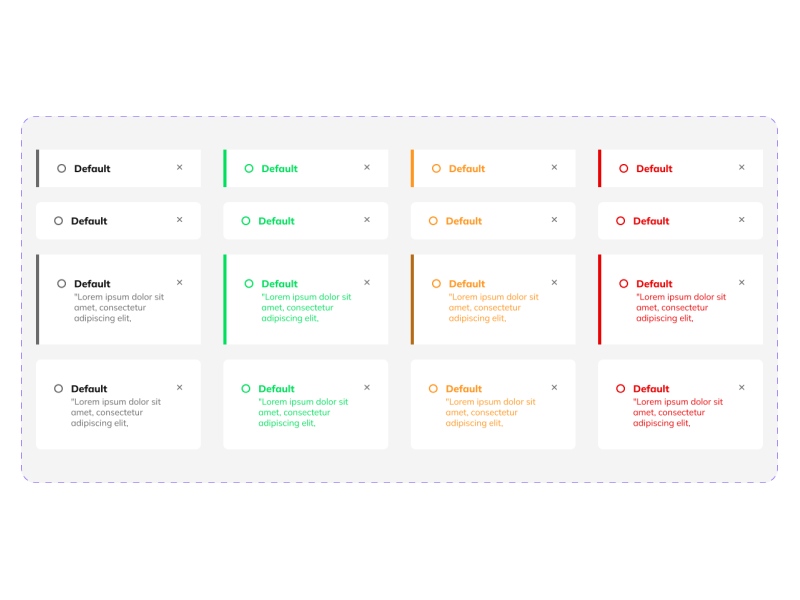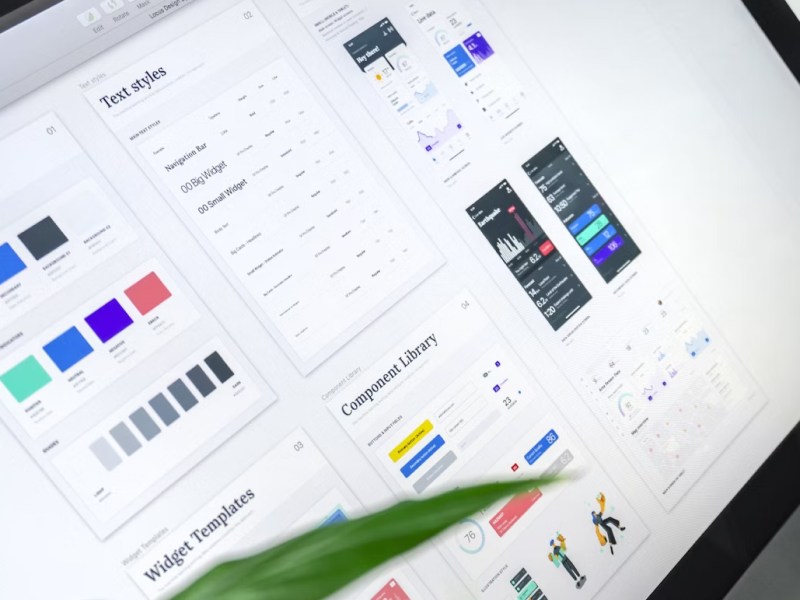Nowadays, every second is used building features, launching updates, and trying to stay ahead of competitors
We get it. You’re in a rush to grow. But don’t overlook the core of a great product: a consistent design implemented in every element that keeps the brand experience authentic and reliable. Startups often invest in pushing their products and services and lose focus of their visual and user experience.
When designing multiple interfaces, small teams should know that consistency is key, no matter the size of the brand they represent. Because the truth is, when thinking of a design system, what comes to our minds are big companies with big budgets. But in reality, a design system can have a powerful impact on small businesses too.
What is a Design System
Let’s make things clear. A design system is more than just a set of rules. Think of it like a toolbox that helps teams create and manage designs in a consistent way.
A design system is a collection of UI components and guidelines to improve the process of UI design. It includes things like colors, typography, buttons, icons, and layout rules, all organized in one place.
If you don’t know where to start, Figma resources are a loved and reliable option. Whether you want to start working on a website, app, or dashboard, Figma design systems offer complete “toolboxes” for creative designers.
Consistent User Experience
Imagine building a house where every room has the walls painted a different shade and every piece of furniture has its own style. A bit confusing, right? A design system brings together all the ideas and rules so every aspect of your “building”, from app to website, looks and feels the same.
When starting a design from scratch, it’s difficult to match everything in a harmonious way, especially under the pressure of time and budget. There are so many things to pay attention to: usability, functionality, fixing bugs, and meeting deadlines. It can get overwhelming to focus on consistency. Using a Figma design system ensures that every screen, new feature, or update will align with your visual identity.
Keep in mind: users love a consistent and intuitive experience!
40% OFF
Only this December
Upgrade to UI PRO version of Uinkits Systems to unlock 23.000 UI components.
Use the code "DEC40"
Save Time and Money
How does it save time? Designers don’t have to redesign buttons, icons, layouts, and so on, for every project. Using a design system for large tasks can save up to 25% of the time needed for product development. It also implies faster prototyping that means products will be marketed quicker.
To track time-related results, we suggest checking key performance indicators like speed to market, team efficiencies, and effect on code.
Now that we have taken care of saving some time, everybody knows that time means money. Fewer work hours mean lower costs. Also, newbies learn faster thanks to clear guidelines. Even more so, fewer design errors and revisions reduce expensive fixes later.
Easy Rebranding
Branding is transforming. Instead of building elements from zero every time you want to make a change, Figma design systems give you the freedom and tools to experiment with all your branding ideas in accessible ways.
When rebranding your product, a smart first step is to duplicate your existing design system and adjust key elements like variables, styles, and atoms. This level of efficiency is only possible if your design system is well-structured.
Updating your brand identity shouldn’t be a hassle. A design system ensures every update is applied smoothly across your product.
Efficient Prototyping
We are great fans of prototyping, and we want to see how things turn out. This way, we can get a realistic preview of our work and make final adjustments. One of the biggest advantages of prototypes is conducting them for usability testing.
A design system lets you build prototypes quickly and easily. Basically, you reuse pre-made elements that you align with your brand, speeding up the process. Without it, you have to create every single detail of the prototype yourself.
When to Use a Design System
You wonder when is the right time to use a design system? Figma resources help you best, especially if your product is on 2 or more platforms. We also recommend having your brand identity set when starting to work with a Figma design system.
If you plan to create multiple features within the same ecosystem, using it will also ease your work. Also, for B2C products is even more important to have a consistent starting point, as it will directly impact user experience and conversions.
And just like that, you’ve seen how a design system is not just a luxury for startups. It’s a necessity for creating strong, unified brand experiences. By investing in a design system early on, you’re setting a foundation for your success. The harmony it fosters around your product can make your brand stand out in the crowded market.
Find out how much of a difference working with a Figma design system would make for your startup! Just give it a try and prepare for growing into it!
uinkits – Our Figma Design System and UI Kits
We at uinkits understand the importance of great user experiences and creating amazing UI designs. That’s why we’ve developed a Figma UI Kit with design components that include these essential UI elements that enable you to design intuitive and user-friendly interfaces effortlessly.
“You press the button, we do the rest.” – Kodak.
Inspired by this iconic tagline from Kodak, we believe in simplifying the design process for you. Our Figma UI Kit, uinkits, is a complete design system with UI components that allows you, as a UI UX designer, to create your products as quickly as pressing a button.
Our design system includes UI components, icons, variables, cards, buttons and everything you need for your design process. All you have to do is take your UI design component needed, and you’re ready to use it in your designs!
By
Gabriel Pana
•
June 17, 2025








